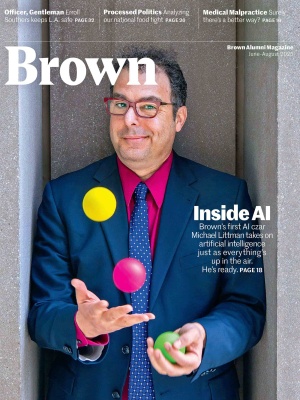Diversity of Perspectives
A letter from Matthew Guterl
President Christina H. Paxson invites Matthew Guterl, Brown’s new vice president for diversity and inclusion, to reflect on his role.
As I write this, gale force winds hit the windows of Horace Mann. The weathered wooden frame rattles constantly, reminding me of the age of the building. And reminding me, too, of the political headwinds we face. The storm lingered for a long while on the horizon. Now that it is here, we dash outside infrequently and return just as quickly. Everyone is drenched to the bone. We worry the dark skies might never leave.
To be the vice president for diversity and inclusion at this moment is an impossible contradiction. At its core, this office represents the driving need for grace, decency, and kindness in any living and learning community. It also reflects the perverse, tragic absence of the same. In a moment of heightened political tension and violence, we steward the University’s commitment to a space free from discrimination and harassment. Along with our partners and colleagues on this campus, we labor long and hard to ensure that everyone feels welcome, that we offer generosity to everyone, though this effort is doomed to be misunderstood, given the rarity of such things in contemporary American life. We endeavor, in a way, to be obsolete, but each day the human failings of our time reinforce the need for this office.
We are one of the reasons that the storm is here. Or, at least, that is what the prevailing wisdom suggests. Efforts to foster a diverse and inclusive campus —or “DEI,” a once celebrated acronym now rapidly vanishing from the national vocabulary—have been singled out for what has gone wrong with America. Some say its elimination by any means necessary is the only solution. My colleagues and I are resolute that a diversity of experiences and perspectives and ideas is central to fulfilling our academic mission to advance knowledge and understanding. We know there are links between innovation and inclusion, diversity and dynamic research.
A month and a half into the job as of the time I’m writing this column, it is hard for me to square the phantasmagorical misrepresentation of this office with my actual everyday experience. At least half of what I do—what we do together—is about solving problems, removing impediments, and ensuring that faculty, students, and staff are able to realize their most ambitious dreams in an atmosphere that is free of hostility and hate. Sometimes, the concerns are existential—worries about deportation, safety, and visa status proliferate these days—but just as often they are ordinary, the kind of quotidian melodramas everyone encounters navigating a college campus. How do I make this conversation happen? What does this word “diversity” mean? Who is the right partner for me in this new and innovative enterprise?
Most of these concerns aren’t meant to be answered by me alone. Being new, though, means that you don’t always know where your lane begins and ends. And, more specifically, it means that when you don’t know something, you must walk a mile to figure it out,
because you are modeling determined compassion. That person sitting in front of you needs an answer. Here in Horace Mann, it is our responsibility to turn no one away.
Sometimes the search for an answer draws you out into the pouring rain. But once you have it, and once you share it, you get to watch relief, or gratitude, or enlightenment wash over the face of a colleague, a student, a staff person. Culture, we know, is a structure of feeling. That structure is built out of relationships, out of conversations, out of the simple provision of answers.
The work doesn’t always end well, of course. Sometimes you get drenched, top to bottom, after merely offering basic help or kindness or sympathy. Sometimes, the tough conversation only gets tougher and tougher. And sometimes you must turn into those headwinds, steel yourself, and furiously defend everything that you and your colleagues represent. What else, I wonder, could be more important?





